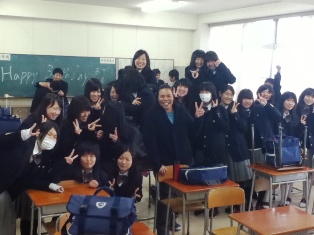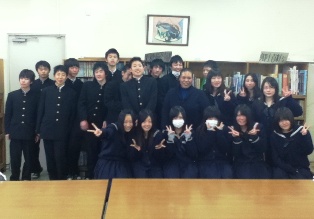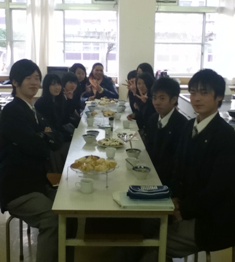JET Programme
◆Life as an Assistant Language Teacher (ALT)
Deidre Yamaguchi
Life as an Assistant Language Teacher (ALT) in Japan has been a great experience for me thus far. Right now, I have a set schedule for everything I have to do pertaining to my job as an ALT and as a mother. The set schedule runs smoothly because I am very comfortable at the schools where I work and I enjoy what I do.

I teach at 2 Hyogo Prefectural High Schools namely Aboshi Senior High School and Takasago Senior High School. Aboshi Senior High School is my “base” school or the school where I spend most of my time while Takasago Senior High School is the “other” school that I go to twice a week also to teach. Before I proceed, senior high schools in Japan are the last 3 years of high school and are usually identified with the high school year itself. For example, “First Year Students” are the 10th graders or sophomores; “Second Year Students” are the 11th graders or juniors; and the “Third Year Students” are the 12th graders or the seniors.
At Aboshi Senior High School, I teach English to first year students; Oral Communication to second year students; and Daily English Conversation to third year students while at Takasago Senior High School, I teach Oral Communication only to the first year students. One very important matter that I must mention and that you must know is that an Assistant Language Teacher (ALT) does not teach a class by herself/himself. An ALT must always have a Japanese Teacher of English or JTE with her/him every time there is a class. So when I say “I” have or “I” teach I am speaking more about my schedule than what I do in class because in class, “WE” teach—ALT and JTE or me and a Japanese teacher. This kind of teaching is called “team-teaching”. And the ALT’s role is to assist the JTE in class activities that will improve students’ listening, reading, speaking, and writing skills which include but are not limited to comprehension and pronunciation skills.
After each section of the textbook is finished, the JTE usually asks me to come up with activities to review and practice what was just covered. To make learning fun, I make up games and quizzes with vocabularies and character’s names from the text; other times I find a video-usually an interesting but short documentary on the subject matter and present it to them; or I just get “interesting” or “fun” clips that are related to the subject matter itself and prepare a power point presentation to enhance what they already know or trigger their interest. Classes are 50 minutes each and if you walk into a classroom with a positive attitude and a smile on your face you will not even realize the 50 minutes go by.

I have learned a lot about the Japanese school system and of course, more importantly, Japanese work-ethics. My work officially begins at 8:20am but when I first arrived in Japan, I usually get to the office by 8:00am to observe and learn what goes on so I will know how to do my job better. My work-day ends officially at 4:05pm but if I have to finish something or I just want to stay for a little while and chat with other teachers in the office and learn some new Japanese words or find out the best places to visit, to eat sushi, or to shop etc. in Japan, I stay for a little while after. The most important thing to remember is that work in Japan is not like work in the islands. If you do not have anything to do, it does not mean that you can just pick up your bags and go home. There are protocols to be followed, papers to be filled out, and a supervisor you have to inform. My advice to you when you start working is: if you don’t know anything or you don’t know what you should be doing, ask your supervisor (who will be a JTE). Your supervisor will be the first person you talk to and if he/she cannot help you then he/she will take it to the next level and so on.
I came to live and work in Japan equipped already with some knowledge of the Japanese culture and way of life, having lived and studied in the country a few years back. So this time around, not many things surprise me. I am, however, continuing to learn new things, especially with Japanese education. For instance, every year the 2nd year students take a trip somewhere as a class and all the expenses for this trip are paid for by none other than the students themselves or rather the families of the students who put in a little money every month when the students first enter the school to save for this occasion. And here I thought, if this were Palau, we would be having a fund-raising event every weekend! Ha ha!

Right now, I can only count my blessings because I am very fortunate to work with people who have been very professional and kind at the same time that I find I am not only teaching but am learning and enjoying every day as it comes.
This is just a brief outlook of my life as an ALT. If you are nervous or think you cannot do this because you have never done it before, then do not worry because if you are selected, you will be sent a JET Handbook which will tell you everything you need to know about living and working in Japan as a JET-ALT plus the JET Programme will host a big orientation once you arrive in Japan to help you get your life and career started. My biggest recommendation to you is that if you are selected and sent that JET Handbook, please read it from front to back because it will help you tremendously. The Handbook will tell you what to expect when you get off the plane in Japan until the day your contract is over and you get back on the plane and go home.
Good luck and if you have any other questions, please feel free to contact me at the email which will be provided upon request.
©Embassy of Japan in the Republic of Palau
P.O. Box 6050 Koror, Republic of Palau 96940

